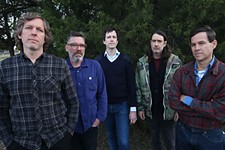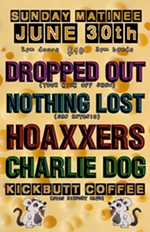Rise Above
Black Flag founder Greg Ginn and SST Records start fresh in Taylor, Texas
By Austin Powell, Fri., Aug. 21, 2009
There's no Convention and Visitors Bureau in Taylor. There's nothing at all, really, save a vintage two-screen cinema, fitting considering the historic downtown – 15 miles east of Round Rock on Highway 79 – exudes the aura of a black-and-white film where father still knows best. It's not a dry county but sure feels like it, charmingly simple and idyllic.
Tucked between the City Hall annex and post office, the new headquarters for SST Records appears almost as a mirage, with a weathered facade and plywood boards covering its storefront windows. The most influential label of the Eighties, SST remains a beacon of resilient independence, responsible for seminal works by Hüsker Dü, Sonic Youth, and the Dicks.
On a Friday afternoon in late 2007, Greg Ginn, the founder and guitarist for iconic hardcore titan Black Flag, answers the buzz of a gargoyle doorbell on the side door. At 6'5", his presence is staggering, belying his resolute and unimposing temperament. He's the new kid on the block, a vegan in a town known primarily for its barbecue.
"It's a different world down here," the then-53-year-old reflects in a careful monotone. "I needed a quiet place to work. It was time for a change, and I like the feel of small towns. Everyone here is real friendly. I feel a little bit like the newly converted."
Originally constructed in 1918 as a Model T assembly shop and dealership, the building, which Ginn found on Craigslist, resembles a Harry Ransom Center collection of the DIY movement, with random artifacts littered throughout. A VHS tape labeled "Meat Puppets in Austin" sits near the entrance, resting beside a row of promotional posters and a hallway filled with master tape reels identified by release number: SST 028, Minutemen's Double Nickels on the Dime.
The studio is a work in progress, as most of the equipment still resides in the Long Beach space that SST has used for the past 12 years. Only the label's cataloged inventory appears properly organized, arranged chronologically beginning with Black Flag's hostile 1978 debut EP, Nervous Breakdown.
A newly renovated, open-faced elevator lifts up to the second level, which houses Ginn's living quarters, office, and kitchen, along with a small greenhouse area. The permeating sense of unpacked history and lack of air conditioning make the upstairs feel like a self-storage facility. Boxes upon boxes of T-shirts, enough to clothe a small Salvation Army, dominate the floor space in teetering columns of various heights – 10 rows deep and 12 wide – brandishing such classic slogans as "Fuck Parental Advice," "Corporate Rock Still Sucks," and "Kill Bono."
After a decade of silence, SST rebooted recently with releases from three of its master's projects: the Taylor Texas Corrugators, Jambang, and Gone. While Ginn cites a number of reasons for the move, including the lower cost of living and proximity to both Austin and a major airport, more than anything it reflects his desire to distance himself from the past. It's a chance to finally start fresh.
"I was really disgusted with the whole business," he says, summarizing the hiatus. "I got tired of dealing with it. Every time we would get going and releasing stuff, our distributor would fold. We lost a considerable amount of money to the point where I couldn't really afford help. There was a grind for quite a long time where I just had to work. We gained more stability over that time.
"I've got a lot to catch up on, and this keeps things a lot simpler."
Everything Went Black

"It was almost like Merry Prankster years, 'cause everyone was in on it," reminisces Curt Kirkwood of the Meat Puppets' time on SST, which released the band's stupefying first six albums (see "What Is This?" April 9, 1999). "We got attention, and all we did was exactly what we wanted to do. We thumbed our nose at anybody we wanted to. They could shove their money in their asses. That was a given, and there was just a wash of influence. Everyone was pretty competitive on a friendly level. It was awesome and beautiful. Irreplaceable."
Whereas Ken Kesey's LSD escapades helped trigger a counterculture awakening on a magic bus trip across the country, SST chiseled its own path through the American underground out of sheer necessity, leaving a blueprint behind for all to follow. Ginn established the label after struggling to find an outlet for his first punk band, Panic, and named it after Solid State Tuners, his mail-order business that specialized in modified World War II surplus radios. SST operated on a shoestring budget and openly challenged the mainstream commercialism of the Reagan era, led by the relentlessly aggressive punk ethos of Black Flag.
What resulted was an unparalleled and fiercely independent chain reaction: the Minutemen's blitzkrieg changeups, the firecracker post-punk transcendence of Hüsker Dü, Sonic Youth's early avant-noise terror, and the reggae-punk wrath of D.C.'s Bad Brains. SST even prefaced the grunge implosion with notable releases from Soundgarden, Screaming Trees, and to a lesser extent, the proto-Melvins doom metal of L.A.'s Saint Vitus.
"Anybody who was alive in that era and had a pulse in any sense of what was going on musically knows how important SST was," recalls locally based Matador Records co-owner Gerard Cosloy. "It was far and away the best label in America. It cast a huge creative shadow over everything else on a purely artistic level."
"I always loved Black Flag, so I found it hard to separate the band from the business," echoes the Dicks' Gary Floyd, who signed to the label after sharing a bill with Henry Rollins and company at Austin's lost punk dive Raul's. "I never looked at them as political, and we were a very political band. I certainly didn't look at them as gay rights activists, and I was out, a queer loudmouth. All of those things that would ordinarily separate us as people were very much bypassed when it came to us being compatible music comrades."
Things weren't always harmonious at SST, though. Sonic Youth, Dinosaur Jr., and the Meat Puppets all took legal action to reclaim their masters, citing similar financial irregularities. Meanwhile, a lawsuit with experimental satirists Negativland over its copyright-baiting 1991 single, "U2," nearly bankrupted the label, but SST always found a way to push forward.
After Black Flag broke up in 1986, Ginn acquired New Alliance Records, reissuing much of its catalog under SST before transforming it into a vessel for avant-jazz and spoken-word recordings. That same year, he also dropped two albums with his free-form, jazz-funk project Gone, later forming the SST subsidiary Cruz Records, which issued his solo records in the early Nineties, among other things. Between those three outlets, Ginn has put out more than 700 releases to date, including roughly 65 titles in 1987 alone, nearly one-tenth of the grand total featuring his hand in some capacity. In retrospect, SST was never really a reflection of the times, but rather a benchmark of where Ginn was personally.
"It was always an organic process, hearing bands I thought other people should hear and then working to get them out there," Ginn concurs. "Pretty much all of them signed to major labels. It was still in that generation where it was in the back of everyone's heads that this big business could lift us up and take us to dreamland. That doesn't exist anymore, and I think it's a good thing. We could have done a lot more if bands were more serious about doing things themselves."
Get in the Van
To borrow a phrase from the Minutemen, Ginn still jams econo. When not hibernating in studio, he plays live up to six nights a week, personally driving his white van, which has logged 80,000 miles in the last two years alone, to each gig. Ginn loads in and breaks down the gear himself, and, in the case of his double feature with the Taylor Texas Corrugators and Jambang at Red 7 this past February, he gives his all even when there's no one really there to give it to.
Ginn begins the evening with the Corrugators on bass, an instrument he's recorded on since Black Flag's My War in 1984, albeit under the alias Dale Nixon. With feet slightly more than shoulder-width apart, he lays down a slow, plodding rhythm over Steve DeLollis' bare-bones backbeat. His head revolves in small clockwise circles, hypnotized by repetition into a state of euphoria, oblivious to those around him as Bobby Banclari freely roams the range on mandolin. It sounds like Ginn's version of a Texas two-step – lengthy and completely improvised Western swing instrumentals, informed by his interests in free jazz and old-time blues.
There's only a slight intermission before the same band members return as Jambang. This time Ginn handles guitar and keyboard duties, triggering a looping backdrop of electronic textures. True to its name, Jambang fuses jarring trance music with dark star improvisation while a flat-screen monitor projects psychedelic visuals from Austin's Joey Keeton in the background, ranging from no-budget homemade videos to something resembling a Windows screen saver. Ginn clearly loosens up as the night progresses, providing an occasional jolt of screaming atonal fury but more often than not simply adding peripheral brushstrokes of guitar. He seems genuinely satisfied with the outcome.
"I have a goal to try and make it work to where it's sustainable," he says later, "but I want to keep playing wherever we can regardless of the financial situation and just adjust what we need to do on our end to make it work. I try to keep it real simple, and it's getting to where I think it'll be good. Certain things, like playing festivals, take years to open up.
"Realistically, to establish ourselves on the map, it's going to be a while longer. We're just going to have to consistently play. That's the most important thing."
Old habits die hard.
Under the Influence of Heat
Since last visiting Taylor two summers ago, little has changed at SST headquarters. The windows are still boarded up, and boxes of records remain stacked throughout both floors like Jenga towers. The only noticeable difference is the installation of a massive studio console in the now-completed recording facility. Gary Piazza, a new guitarist and keyboardist Ginn recruited after witnessing an opening set from the Incredible Sheep Shrinking Invention in Redding, Calif., rests fast asleep atop a mattress on the studio stage.
The 30-year anniversary of SST Records has come and passed without notice or commemoration, an odd occurrence given the market these days for punk rock nostalgia. After all, Sonic Youth, Dinosaur Jr., and the Meat Puppets all reissued their respective SST catalogs on new labels; Bad Brains headlined last year's Fun Fun Fun Fest; and Saint Vitus is reuniting for a few shows this fall. Sitting comfortably at his office desk, which is cluttered with invoices, burned CDs, and a small portable amplifier, Ginn shrugs off the significance.
"The reason, quite honestly, is that I don't have any passion for it," he retorts, adding later that he turned down a million-dollar reunion offer from Coachella. "I'm glad that other people are more archival, but doing that work sounds like the most boring thing in the world. It's more likely to make me feel sad – these bands that once upon a time had hope and energy that they would go out and do something new, and now they're basically trying to re-create the past. I'm proud of Black Flag and all, but I'm not really interested in playing monkey for anybody – throw some coins in a cup, and I'll regurgitate some songs I wrote when I was 11 years old.
"People impress time historically. It's kind of like Las Vegas, the way musicians go there to retire. It's strange the Eighties have hit that market where they can do much better now than they ever did in the first place."
Peacefully confident and content, Ginn has progressed to a new phase of life defined equally by jam-band culture and fatherhood. He camped for four days alongside his two young daughters, who recently moved to Austin with their mother, at the Wakarusa Festival in Arkansas as a mere spectator. With SST general manager Jose Barraza, one of three employees at the label, Ginn plans to open a dance hall, the Thorndale Saloon, and hopes to use his storefront to further his volunteer work with cat rescue.
Ginn's personal transition colorfully reflects his prolific output since relaunching SST in 2007. He's issued two platters from Taylor Texas Corrugators – Bent Edge and last year's aptly titled Goof Off Experts – matching his LP output with Mojack, a longstanding side project with saxophonist Tony Atherton. Then there's Jambang's debut, Connecting, and the 10th LP from his progressive jazz-rock project Gone, The Epic Trilogy, presented as a double album, with and without vocal accompaniment from Bad Brains' H.R. All six works were produced by Ginn and are available for free download (www.sstsuperstore.com). A multimedia DVD of new material from Jambang and the Corrugators' third album are currently in the works.
"When I'm active, I generally put out a lot of stuff in a short period of time," Ginn concedes. "We've been successful in getting people to know it's not going to be Black Flag. Any song you're going to hear is going to be two years old at the most and likely improvised on the spot. I'm trying to introduce new music, the way I always have. I know it can be a lot for people to absorb, but I don't take that as my problem.
"That's the weird thing about popular music. People always ask, 'Why are you doing so much?' That seems like the strangest thought in the world. A better question would be, 'Why do people do so little?'"
Damaged
Upon its release in late 2007, Ginn initially dismissed the Dirty Projectors' Rise Above, a high-art reimagining of Black Flag's 1981 full-length debut, Damaged. "I'm really tired of the whole postmodern irony in independent music," Ginn riffed over lunch at Rudy Mikeska's Bar-B-Q Cafeteria in Taylor. "It started with post-punk: Everything had to be hyper-ironic, everything had to be clever, this or that concept. That stuff can be entertaining, but I'm more interested in hearing someone do something that's coming from them and isn't a trick of the media or perception."
Yet Ginn still arrives early for sound check on this hot July night at Red 7, where he's billed as the Projectors' special guest. He's packed only his guitar and amplifier for the occasion, the rest of his van barren except for his daughter's tricycle and a few toys. "I wasn't sure if they even knew I played bass," he reasons outside the hardcore haven.
Had the Dirty Projectors existed two decades ago, it would've been an ideal fit for SST. The acclaimed Brooklyn band is at the forefront of indie rock's new density movement, melding the Talking Heads' cathartic art-funk with white flashes of R&B and a chorus line of oddly syncopated female vocals behind leader David Longstreth's slippery croon. Introducing its version of Black Flag classics to Ginn, the Projectors look as though they're trying to reteach him how to ride a bike, only it's one from the Victorian era with a big wheel in the front and a small one in the rear.
The generational disconnect only thickens during the impromptu jam session that opens the show a few hours later. The Projectors – Longstreth, bassist Nat Baldwin, and drummer Brian McComber – attempt to corral Ginn into tightly paced crescendos, cornering him onstage and noticeably revving up the tempo. Undeterred, Ginn stays locked into his own groove, issuing light scratches of nearly inaudible avant-jazz guitar as if perpetually waiting for the right moment to come.
Early into the headlining set, Ginn rejoins the Dirty Projectors – now rounded out by vocalist Haley Dekle and multi-instrumentalists Amber Coffman and Angel Deradoorian – for a medley of Rise Above's "Gimmie Gimmie Gimmie" and "Thirsty and Miserable." He struggles to find his place throughout, the effect like that of a fun-house mirror inverting all that was sacred about the originals. The audience reaction is one of mild-humored confusion. Few in the sold-out crowd seem to recognize Ginn, and only scattered applause follows his departure.
The awkwardness of the occasion only further reiterates the constant contradictions of Ginn's life. Like so many unpacked boxes of dormant history, he's trapped in the shadow of his past even as he attempts to move past it.
The drive back home to Taylor probably never felt so good.
10 Essential SST Records
Black Flag, Damaged (1981)
Hüsker Dü, Zen Arcade (1984)
The Dicks, Kill From the Heart (1983)
Meat Puppets, Up on the Sun (1985)
Minutemen, Double Nickels on the Dime (1984)
Bad Brains, I Against I (1986)
Sonic Youth, Evol (1986)
Descendents, All (1987)
Dinosaur Jr., You're Living All Over Me (1987)
Soundgarden, Ultramega OK (1988)
10 SST Records You Might've Missed
No Man Is Roger Miller, Win! Instantly! (1989)
Saint Vitus, Born Too Late (1986)
Pat Smear, So You Fell in Love With a Musician ... (1992)
Saccharine Trust, We Became Snakes (1986)
Firehose, If'n (1987)
Screaming Trees, Anthology: SST Years 1985-1989 (1991)
Sister Double Happiness (1988)
Grant Hart, Intolerance (1988)
Negativland, Escape From Noise (1987)
The Stains, The Stains (1983)














